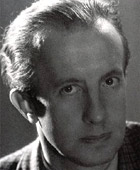 is really quite a bit like early John Ashbery. It's funny when you have a sort of "you're busted" moment with a writer you know very well: seeing all of a sudden where they lifted a significant part of their literary personality. I'd even say, too hastily, that Eluard stands to Ashbery as Jules Laforgue does to Eliot. I need to think more about how to back this claim up (also whether, and when, and how closely, Ashbery read him), but for now I'll just post a brief juxtaposition of texts, the first by Eluard, the second by Ashbery:
is really quite a bit like early John Ashbery. It's funny when you have a sort of "you're busted" moment with a writer you know very well: seeing all of a sudden where they lifted a significant part of their literary personality. I'd even say, too hastily, that Eluard stands to Ashbery as Jules Laforgue does to Eliot. I need to think more about how to back this claim up (also whether, and when, and how closely, Ashbery read him), but for now I'll just post a brief juxtaposition of texts, the first by Eluard, the second by Ashbery:Max Ernst
(translated by Mary Ann Caws and Patricia Terry)
In a corner agile incest
Circles the virginity of a little dress.
In a corner the sky turned over
To the spines of the storm leaves white balls behind.
In the brightest corner of every eye
We're expecting the fish of anguish.
In a corner the car of summer
Immobile glorious and forever.
In the light of youth
Lamps lit very late.
The first one shows its breasts that red insects are killing.
Two Scenes
We see us as we truly behave:
From every corner comes a distinctive offering.
The train comes bearing joy;
The sparks it strikes illuminate the table.
Destiny guides the water-pilot, and it is destiny.
For long we hadn't heard so much news, such noise.
The day was warm and pleasant.
"We see you in your hair,
Air resting around the tips of mountains."
It's the quiet, careful oddness of these poems, the uncanny coupling of abstract nouns ("virginity," "anguish," "joy," "destiny") with spatial and physical descriptors ("corner," "eye," "car," "table," "mountains"), negotiated between a teasingly ambiguous "we" and "you," that makes them similar. Note that compared to the stuff each of these poets' contemporaries (the Surrealists and the New York School) were up to in this period, this is incredibly restrained writing.
